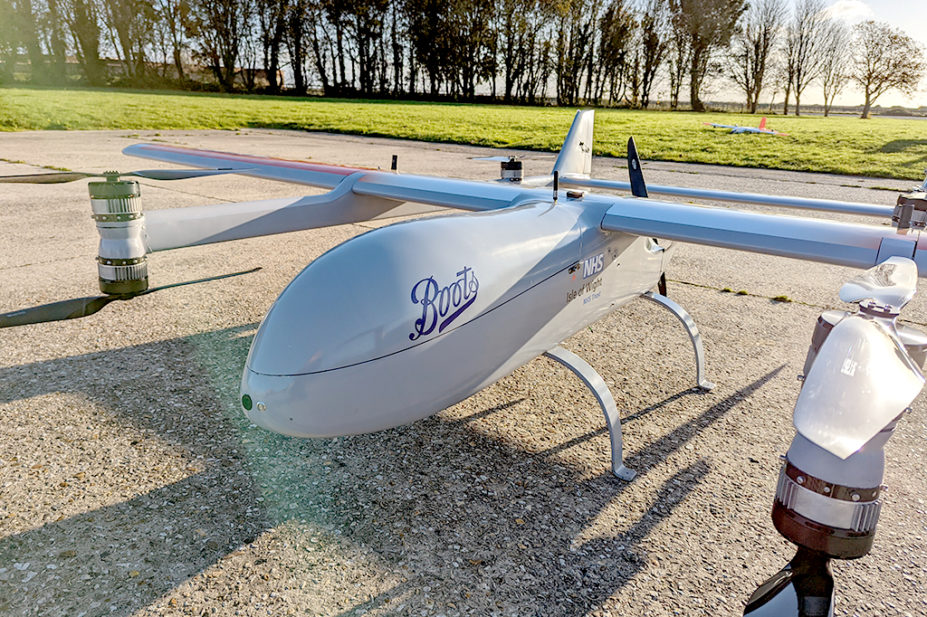
Boots
Medicines could be flown across Scotland by drone in 2023 after a consortium, including NHS Scotland, airports, air traffic control and the University of Strathclyde, won £10m funding to develop a national drone network throughout the country.
The network is intended to transport medicines, bloods and other medical supplies by drone, including to remote communities in Scotland.
The consortium has already designed drone landing stations for NHS sites across Scotland and developed a virtual model of the proposed delivery network.
The vision is to connect hospitals, pathology laboratories, GP surgeries and distribution centres across the country. The first live flight is expected to take place in 2023.
The consortium, Care and Equity – Healthcare Logistics UAS Scotland known as ‘CAELUS‘ — includes 16 partners and is partly funded by Innovate UK’s Future Flight Challenge, which provided the most recent round of funding, amounting to £10.1m.
Hazel Dempsey, innovation project manager at NHS Grampian — the lead health board on the project — said it was looking at how drones could improve logistics, particularly for urgent deliveries where they might otherwise need to use taxis or other inefficient methods.
She gave the example of chemotherapy treatment for myeloid leukaemia, where subcutaneous injections need to be taken on 7 consecutive days, every 28 days. The medication has to be freshly prepared by a specialist laboratory, which means patients in remote areas may need to travel for hours each day to reach a hospital able to provide treatment.
“Could we think about testing immediate administration by flying it to the patient, so they get to stay at home with their support network around them?” she asked.
Dempsey added that NHS Grampian had many potential use cases to consider.
“We have to prioritise where we think we can add the biggest value for patients,” she said, adding that “pharmacists will be part of that discussion”.
Fiona Smith, project director at CAELUS and head of aerodrome strategy at Aberdeen, Glasgow and Southampton Airports group, said the project “is set to revolutionise the way in which healthcare services are delivered in Scotland”.
“A drones network can ensure critical medical supplies can be delivered more efficiently; it can reduce waiting times for test results and, more importantly, it can provide equity of care between urban and remote rural communities,” she said.
The new funding will allow them to start live flights and to develop the infrastructure needed, including landing bases, she said. She pledged that the consortium would engage with local people so they understood how and why the drones were being used.
Andy Keen, clinical lead for innovation at NHS Grampian, said: “NHS Grampian is proud to be the lead board for NHS Scotland on CAELUS and we very much look forward to working with our sister health boards across Scotland, and our industry partners over the next couple of years.
“Our local innovation hub will be exploring how drone technology could be usefully used as a way of delivering care to people who live in urban, remote, rural and island locations.”
He said Grampian was “uniquely positioned” to lead the project “because it covers such a vast geographical area with an approximately 50/50 spilt of urban and rural populations”.
Flight trials will be run by Skyports, a drone operator which worked with the NHS in 2021 to transport COVID-19 samples in the Argyll and Bute region.
NHS Scotland’s plans to transport medicines by drone come as Boots UK announced on 27 July 2022 that it has already completed its own test drone flight from Portsmouth to the Isle of Wight, and is working with medical drone start-up company Apian to assess the potential for transport medicines by drone.
The drone flew from the British Army’s Baker Barracks on Thorney Island near Portsmouth to St. Mary’s Hospital on the Isle of Wight. The medicines were collected by Boots and distributed to pharmacies across the island.
Rich Corbridge, chief information officer at Boots UK, said: “It is incredibly exciting to be the first community pharmacy in the UK to transport [medicines] in this way. An island location like the Isle of Wight seemed like a sensible place to start a trial of drones and their value to the delivery of medicines to more remote locations is very clear.
“We will be looking at how much time we can save, as well as how we can incorporate drones into our medicines supply chain to create economic efficiencies too. We want to prepare now for the wider use of this technology in the future.”
The drones used by Boots are electric vertical take-off and landing aircraft, weighing up to 85kg with a wingspan of 5 metres. They can carry up to 20kg of cargo.
A video of the test flight taking off can be seen here.


